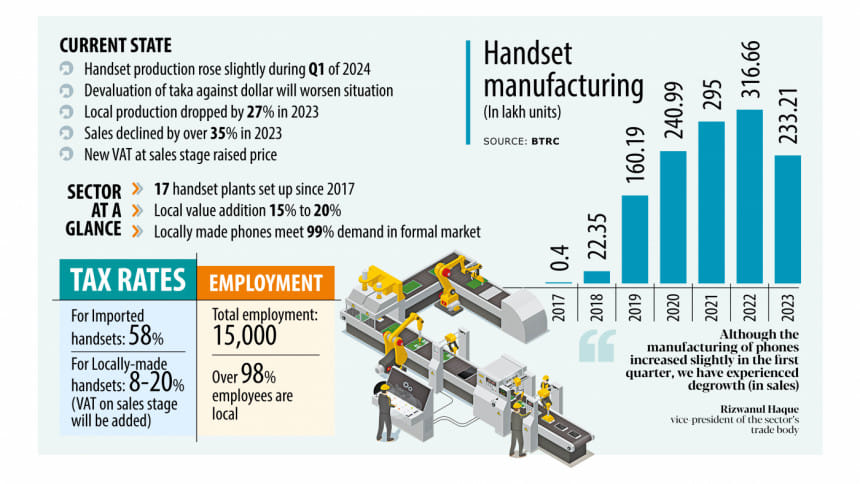Handset production sees a slight rise amid bleak outlook

The local production of handsets increased slightly in the first quarter of 2024 while sales dropped as industry people are projecting a grim scenario amidst the recent record devaluation of the taka against the US dollar.
Handset production rose 5.30 percent year-on-year in the first quarter of this year to 60.74 lakh, according to the Bangladesh Telecommunication Regulatory Commission (BTRC).
However, the increase is negligible when compared to the pre-crisis January-March period of 2022, when about 1 crore phones were manufactured locally.
"Although the manufacturing of phones increased slightly in the first quarter as the industry was eyeing good sales during the peak season of Eid-ul-Fitr, we have experienced degrowth (in sales)," said Rizwanul Haque, vice-president of the Mobile Phone Industry Owners' Association of Bangladesh (MPIOAB).
He said the recent devaluation of the taka against the dollar "added insult to injury" for the industry.
Of the 60.74 lakh phones manufactured in the last quarter, 64.59 percent were feature phones.
Over the past two years, the mobile manufacturing sector has been struggling for survival due to challenges in securing an adequate number of letters of credit amidst a dollar crisis and escalating dollar prices.
The industry has also witnessed a significant downturn in sales, coupled with the proliferation of the grey market, further exacerbating its predicament.
The local production of handsets dropped in 2023, the first decline since domestic manufacturing began in Bangladesh in 2017.
In the January-December period of 2023, domestic companies manufactured 2.33 crore mobile phones, marking a decrease of 26.35 percent from the 3.16 crore units produced during the corresponding period the year before.
Consumer spending has also tightened significantly owing to inflation remaining persistently high for the past two years.
The price of handsets has increased by about 40 percent in some cases.
So, unless people's purchasing power is restored to previous levels, the industry will face difficulties in staging a turnaround and achieving growth.
The slump is so significant that the number of locally manufactured phones in 2023 was even lower than that in 2020. Over 2.40 crore handsets were made in 2020.
Despite acute global supply chain disruptions to the mobile device component market due to the Covid-19 pandemic, 2.95 crore handsets were produced in 2021.
In 2022, 3.16 crore handsets were produced locally, which accounted for 99 percent of the local demand through official channels.
But over the last year, mobile phone sales plunged over 33 percent, according to the MPIOAB.
According to the association, illegal and informal channels currently capture about 35 to 40 percent of the overall handset market in Bangladesh.
Industry stakeholders have called on the government to explore alternative measures to address the grey market if tax reductions prove impractical.
One proposed solution involves the adoption of a National Equipment Identity Register (NEIR) to safeguard the local mobile phone manufacturing sector.
Introduced by the BTRC in 2021, the NEIR aims to ensure the use of legitimate mobile devices in the country by linking their IMEI number with the customer's national identification and SIM numbers.
But although Bangladesh took the lead in introducing NEIR, other countries managed to implement it first. For instance, Pakistan and Nepal now utilise the NEIR to curb illegal trade and support local manufacturers.
But in Bangladesh, crucial functions like blocking fake, unauthorised, or cloned handsets are not yet operational. The government has also not initiated the blocking of illegally-imported mobile phones.
A few months earlier, Zunaid Ahmed Palak, state minister for ICT, announced that illegal and smuggled handsets would be disconnected from mobile networks.
The BTRC recently issued a public notice to launch a drive in this regard in July.
However, last week, Sheikh Reaz Ahmed, a commissioner of the BTRC, said phones currently in use were being registered with the BTRC's system and they have no plans to disconnect unregistered ones for now.

 For all latest news, follow The Daily Star's Google News channel.
For all latest news, follow The Daily Star's Google News channel. 








Comments